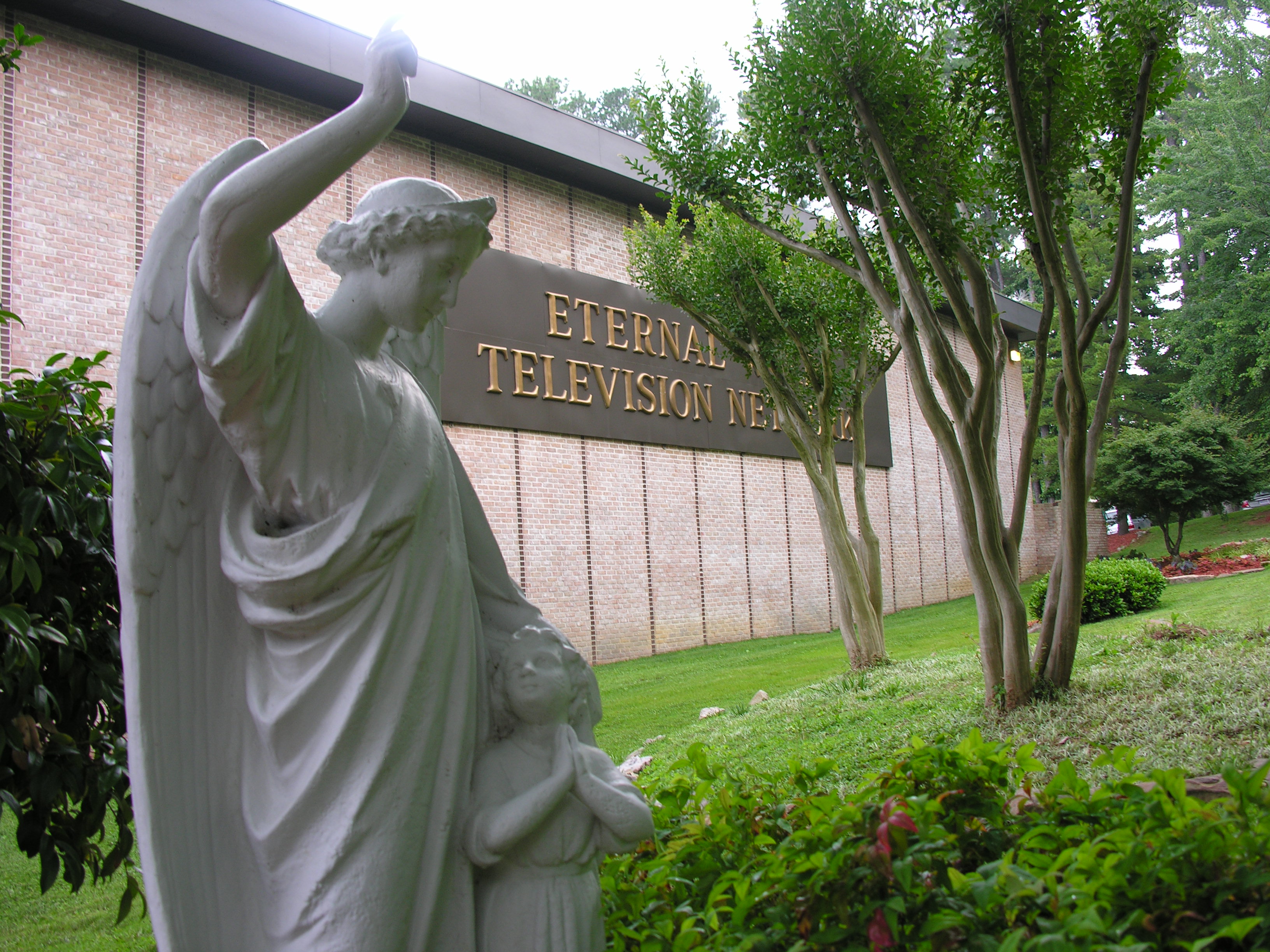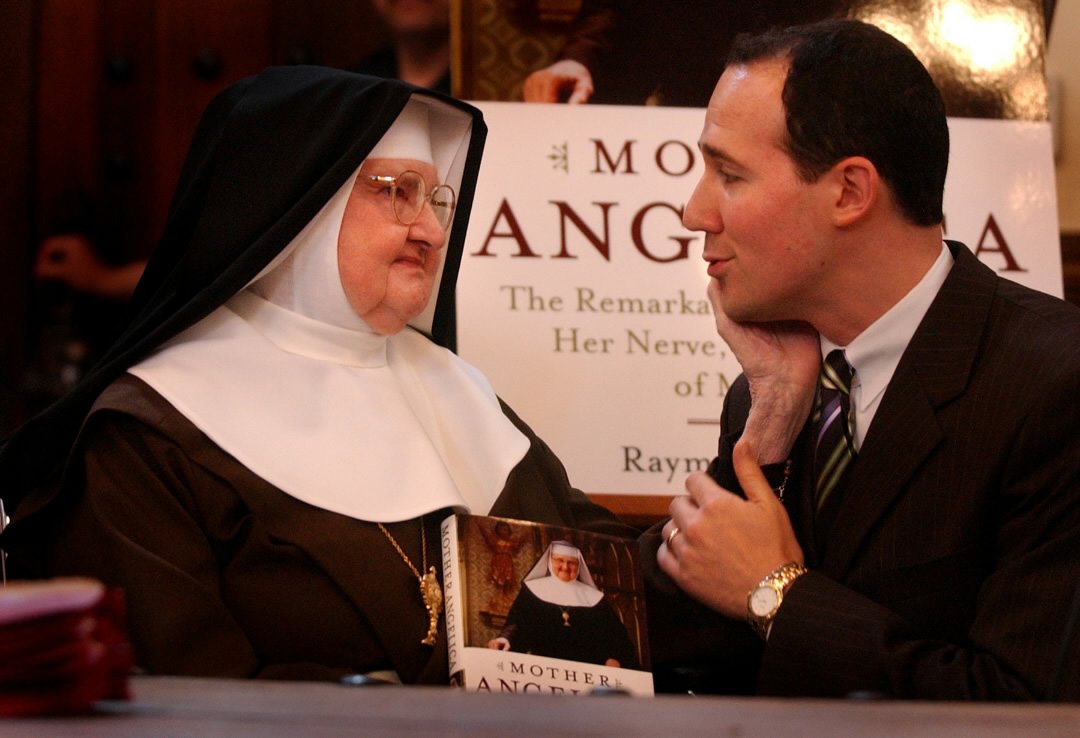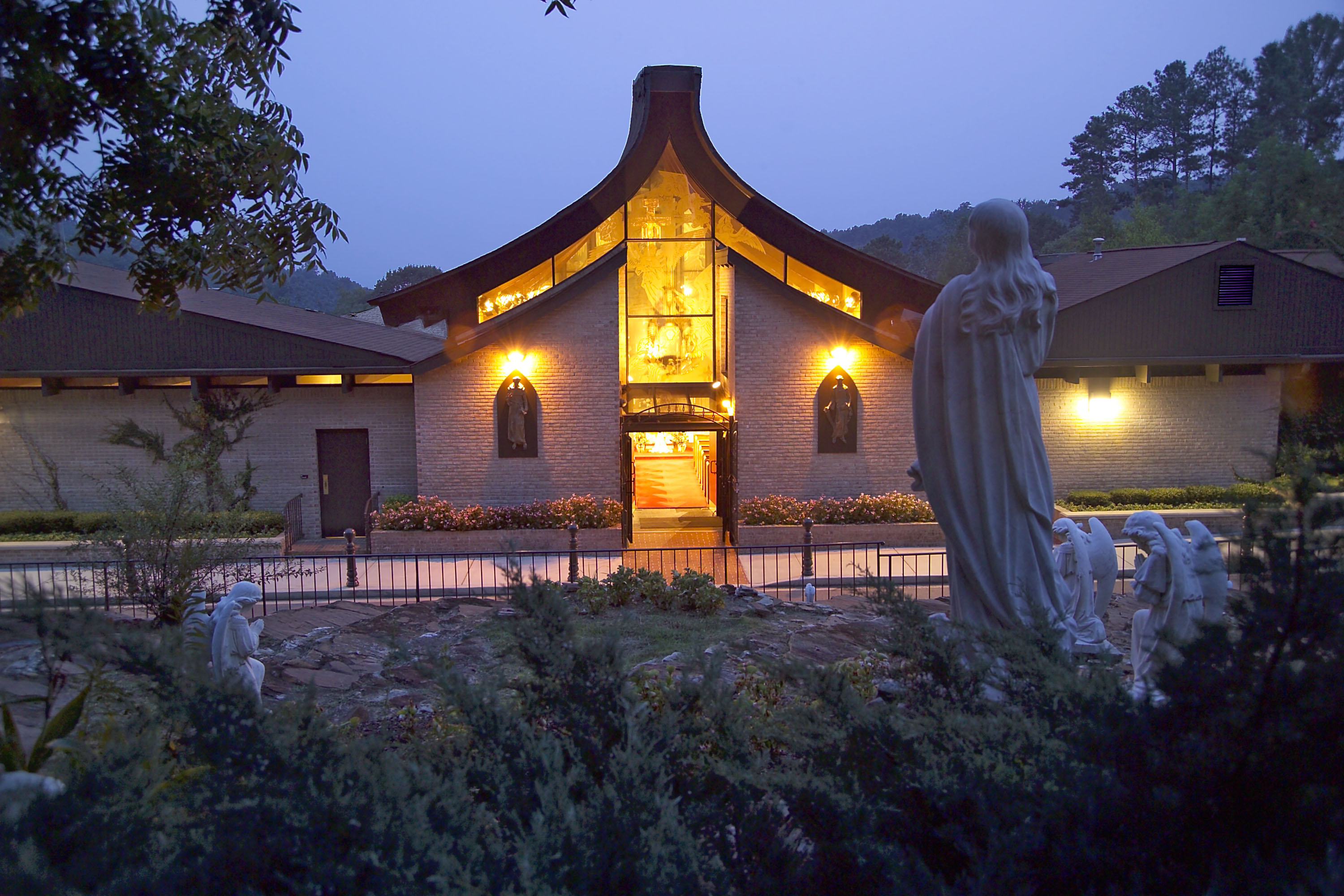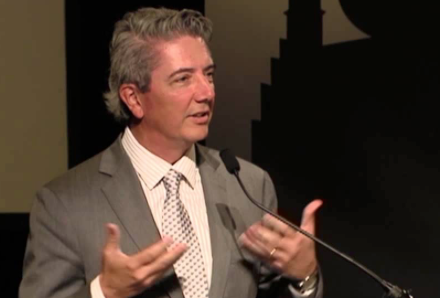
The front of the EWTN studios in Irondale, Alabama. (Courtesy of EWTN)
EWTN founder Mother Angelica had a clever saying to remind viewers to mail their donations in support of her growing network: "Keep us between your gas and electric bill."
Although it sounds dated in an era of online bill-paying, surely, thousands, if not millions, of viewers over the years have sent in their hard-earned money to contribute to what has become the largest religious network in the world. But as essential as these smaller donors have been to EWTN's success, they pale in comparison to the contributions of a smaller number of wealthy contributors — individuals and organizations — whose financial support correlates with the pro-Republican and anti-Francis editorial direction of the network’s programming and news coverage.
Although Mother Angelica and her order initially sold everything from fishing lures to peanuts to cassette tapes of her talks to raise money for their ministries, the nun with a head for business seems to have successfully connected with deeper pockets early on.
A biography of Mother Angelica written by EWTN anchor Raymond Arroyo provides some insight into her early financial strategy, which she termed "a theology of risk" that involved trusting that God will provide. EWTN started its first year "more than a million dollars in debt and facing operating expenses of $1.5 million a year," according to "Mother Angelica: The Remarkable Story of a Nun, Her Nerve, and a Network of Miracles."
Some of the wealthy donors are unnamed, such as "a businessman calling from his yacht in the Bahamas" who sent Mother Angelica $600,000 to pay off debt from buying a satellite dish, or a "lawyer and his wife" in Florida who gave $700,000 to pay off most of EWTN's loans in 1984.
But other early individual donors are named in the biography, such as:
- Peter Grace of the Grace Foundation, who provided Mother Angelica with loans in excess of $750,000;
- Joe and Lee Bruno of Birmingham's Bruno's supermarket chain, who provided EWTN with a mobile production facility worth well over $600,000;
- New Orleans banker and real estate developer Joseph Canizaro, who gave Mother Angelica $1 million;
- and the Bombergers of Florida, who gave at least $150,000. (Carolyn Bomberger runs the Catholic Koch Foundation created by her parents, Carl and Paula Koch—no relation to Charles Koch and David H. Koch, known for their funding of conservative political causes.)
Another major donor was Harry G. John, the controversial heir to the Miller Brewing fortune, through his De Rance Foundation, which was the world's largest Catholic charity until it was dissolved in 1992 after John was found guilty of gross mismanagement.
John had tried to fund his own conservative Catholic media outlet through a partnership with Santa Fe Communications, which still broadcasts a live Mass in the Milwaukee area. Arroyo said that Mother Angelica sold re-broadcasts of her shows and talks to Santa Fe for $200 a minute, generating enough income to forgive any debt EWTN owed John.

Mother Angelica, founder of the EWTN Catholic cable network, is seen with Raymond Arroyo, EWTN's news anchor and author of a biography on the pioneering nun, in this 2005 photo. (RNS/Linda Stelter)
But the largest early individual donor was Dutch millionaire Piet Derksen, who after a brief meeting with Mother Angelica in a Rome hotel lobby, gave her $23 million to start her first short-wave radio station, WEWN. Derksen, who died in 1996, made his money from a chain of sports stores.
In addition to individual donors, foundations and groups such as the Knights of Columbus, the Cardinal Bernard Law Foundation, and the German-based Aid to the Church, are mentioned in the Arroyo biography.
By 1998, after less than two decades on the air, EWTN claimed $49 million in assets and annual income from contributions of $19 million, according to IRS figures quoted by Arroyo.
Complex assets
EWTN's assets today are less easily summarized, since its empire is diversified and complex.
According to tax data from 2016 (the most recent year that includes complete numbers, as EWTN changed the dates of its fiscal year in 2017 and filed a shortened return), Eternal Word Television Network Inc. shows total revenue of $60 million, net assets of $50.7 million, net income of $3.8 million and $23.8 million in salaries for 371 employees. Reports from previous years show total contributions from 2013-17 of $230 million.
But the EWTN 501c3 nonprofit is just one financial entity and does not include other "related" organizations in which EWTN is a direct controlling entity, both in the United States and around the world.
Those global entities include EWTN Canada and EWTN-TV gGmbH in Germany, which has been broadcasting since 2011. According to tax documents, EWTN Inc. has given the German entity more than $1 million in gifts in the past three years. EWTN also controls EWTN-TV Stiftung, a foundation that supports the network's work in Germany.
Another related entity listed on the EWTN's tax documents is ACI Prensa, a news agency in Peru. In 2014, the ACI Group—which included the Spanish-language ACI Prensa, the Portuguese ACI Digital, the Rome-based ACI Stampa and English-language Catholic News Agency (which also has a German edition) — merged with EWTN. No money was exchanged.
All three news agencies had been part of the Colorado-based Catholic Information Agency, headed by Alejandro Bermudez, who is a member of the Peru-based Sodalitium Christianae Vitae movement. A Vatican investigation has determined that the group's lay founder abused young men, including a minor.
The ACI group is now part of EWTN News Inc., a separate entity that also includes the NationalCatholic Register newspaper (which EWTN acquired in 2011 from the Legion of Christ), ChurchPop (a "Christian culture brand"), the D.C. News Production group and EWTN's Vatican Bureau as well as news shows such as "EWTN News Nightly," "The World Over," "EWTN Pro-Life Weekly" and "Force for Good" (a business-themed show that is a co-production with Busch School of Business at The Catholic University of America).
Advertisement
EWTN News Inc. had $4.5 million in revenue in 2016, with total assets of $1.1 million. Because of expenses, it operated at a $6 million loss that year, however.
EWTN Publishing — a partnership with Sophia Institute Press— also is a separate entity, with its 2016 tax documents showing $153,000 in income and total assets of $291,000.
EWTN Religious Catalogue Inc. had an additional $3.1 million in revenue in 2016, total assets of $1.8 million and $1.5 million in salaries for its 40 employees.
The catalogue company sells books, DVDs, statues, art, rosaries, crucifixes, jewelry and other specialty items, such as Sts. Peter and Paul bookends, and a choice of a dozen different chapel veils for women and a "Man of Strength" pottery mug for men. A monstrance pendant and Infant of Prague statues are listed under "Mother's favorites," while a single-decade rosary bracelet with a diamond chip will put buyers back $995.
Other EWTN assets include trusts and endowments, such as the Sebastian Paul Long Testamentary Trust ($1.1 million), the Failla Endowment ($1.8 million), the Harnischfeger Trust ($981,000) and others, for a total of more than $4 million, according to 2016 tax documents.
Current tax documents also reveal EWTN's own charitable giving, with its most sizeable grants going to the religious orders and institutions founded by Mother Angelica. EWTN gives about $300,000 a year to the Our Lady of the Angels Monastery in Hanceville, Alabama, home of the Shrine of the Most Blessed Sacrament and the cloistered Poor Clare Nuns of Perpetual Adoration. The order of priests and brothers, the Franciscan Missionaries of the Eternal Word, also founded by Mother Angelica, receives another $150,000 or more per year from EWTN.
Other donations from EWTN indicate an ideological slant. They include $8,000 in 2016 to the neoconservative think tank Project for the New American Century, $7,500 in 2016 to Young Catholic Professionals, and $10,000 in 2017 to the Susan B. Anthony List, an anti-abortion group that heavily supports Republican politicians.
In 2016, EWTN donated $7,500 to the Becket Fund for Religious Liberty, which represented the Little Sisters of the Poor in their fight against accommodations regarding the contraceptive mandate in the Affordable Care Act.
Generous contributors
Where does EWTN get the money to operate all these entities? Since it provides much of its programming for free, a substantial portion of its income comes from contributions, both from foundations and individuals, according to documents summarizing charitable gifts to the organization.
The Knights of Columbus, which supports a number of conservative Catholic causes, gave $1.25 million to EWTN in 2014, specifically to sponsor its news show. It gave two more gifts of $250,000 each in 2015, according to NCR reporting.
Other major donors have similar connections to conservative causes. The Stephen and Mary Birch Foundation, based in Wilmington, Delaware, has given six grants totaling $705,000 to EWTN.

The chapel on the grounds of the EWTN offices and studio in Irondale, Alabama. (Courtesy of EWTN)
The Birch Foundation (no connection to the John Birch Society) was created by the founder of the largest copper producing company in the U.S. and is now run by Rose Patek, a Catholic lay woman active in many Catholic ministries in the Boston area. The foundation donates to many civic and Catholic groups, including Focus on the Family; a school affiliated with the Legion of Christ/Regnum Christi; the Cardinal Newman Society, which sees itself as a "watchdog" for Catholic identity in higher education; and the Alliance Defending Freedom, which defends religious freedom.
The Wisconsin-based Mercy Works Foundation has given EWTN five grants totaling $117,500. This charity, founded by Anchor Food Products founder Robert Follett, also contributes to the Legion of Christ and is a major funder of Relevant Radio, having given $6 million over three years, 2005 to 2007.
And the W.G. Christianson Foundation, based in Minneapolis, gave a total of $860,000 from 2002-13. It also is a funder of the American Life League, Priests for Life, the Population Research Institute and the apologetics organization Catholic Answers.
EWTN also receives substantial money through non-religious community foundations, many of which are "donor-advised funds," which act as a parent fund for individuals' charitable contributions without having to set up their own foundation.
The San Diego Foundation has given EWTN three grants totaling $1,020,000. Other smaller grants have come from community foundations from Omaha, Minneapolis, Rochester (New York), Fort Wayne (Indiana), Houston, Grand Rapids (Michigan), Louisville, New Orleans, Kansas City, Atlanta, Southeast Michigan, Columbus, Denver and Arizona.
One donor whose financial contributions cannot be quantified is Frank Hanna III, a former corporate attorney turned investment banker and founder of Hanna Capital LLC, who has shown up on lists of Atlanta's wealthiest people. A member of the Legion of Christ's consecrated lay movement Regnum Christi, Hanna is very active in conservative Catholic philanthropy.
Hanna has served or advised the boards of numerous conservative Catholic organizations, in addition to EWTN's, including the Napa Institute and the Catholic University of America business school named for Napa founder Timothy Busch; the Catholic Leadership Institute (a sponsor of the Napa Institute); Seton Education Partners (for homeschoolers); the Institute for the Psychological Sciences (part of the Legion of Christ-sponsored Divine Mercy University in Arlington, Virginia). He also has served on the boards of the Acton Institute and American Enterprise Institute, a libertarian and laissez-faire think tank, respectively.
According to his biography, Hanna has been instrumental in founding 13 schools, from preschool through post-secondary, and served as chair of a Commission on Education Excellence under President George W. Bush. He is a knight in three Catholic organizations: the Knights of Malta, the Knights of the Holy Sepulchre, and the Knights of the Grand Cross of the Order of St. Gregory. He is a steward of the Papal Foundation, which requires a $1 million minimum donation.

Frank Hanna presents at a 2014 conference on economic justice sponsored by the Napa Institute. (YouTube/Napa Institute)
He founded the Solidarity Association, which is best known for its purchase of the oldest surviving copy of portions of the gospels, which he donated to Pope Benedict XVI. The association's list of supported organizations provides a fairly comprehensive list of the web of conservative Catholic organizations in the U.S.
The Solidarity Association is set up as a Catholic "association of the faithful," rather than a regular 501c3 nonprofit, and thus does not have to file the tax documents that reveal an organization's budget, net worth, boards of directors and other information.
Other EWTN board members include Alabama native John N. "Jack" McAleer, former executive vice president of Krispy Kreme (whose father initially brought that company to financial success). Called "modern models of the Medicis," because of their financing of artistic ventures like a new production company, McAleer and his wife, Jamie, are on the board of Legatus, an organization for wealthy Catholic business leaders, and the traditionalist Franciscan University at Steubenville. They also are behind 4PM Media, a for-profit religious film company started by their son-in-law, Dan Johnson. Jamie is a convert to Catholicism; Jack describes himself as a "revert," said to have been inspired by Bishop Robert Barron. They have served on the board of Life Teen and Impact Center.
Another board member with conservative ties is Bernarda "Berni" Neal, a former marketing professional who now is dedicated to Catholic evangelization and philanthropy. In addition to serving on EWTN's board, she sits on boards for Legatus, Thomas Aquinas College, the Catholic Leadership Institute and Obria Group, a nonprofit aimed at creating a brand of pro-life health clinics. Neal is also involved with the Leonine Forum — which sponsors young "fellows" in Washington, D.C., and New York City for Catholic formation — and the Magnificat Foundation, which puts out a worship aid. She and her husband, Rob, a partner in a commercial and industrial real estate firm, are stewards with the Papal Foundation.
These board members have oversight over all of EWTN’s operations, including new operations. In less than a month, EWTN will launch its latest project, ACI-Africa, a Kenya-based news agency that will produce content in publish content in English, French and Portuguese.
"The Church in Africa is vibrant and continues to see exponential growth," said EWTN CEO Michael Warsaw in a press release announcing the new project in May. "My hope is that this new service from EWTN will help continue to build up the African Church and also ensure that the voice of the African Church is heard more clearly around the world with content that is shared through EWTN's other news platforms."
The newest addition to the EWTN media empire, the press release reminds, "is the latest development in EWTN's efforts to continue to expand its news presence in the global Catholic digital and multimedia marketplace."
[Heidi Schlumpf is NCR national correspondent. Her email address is hschlumpf@ncronline.org. Follow her on Twitter @HeidiSchlumpf.]







